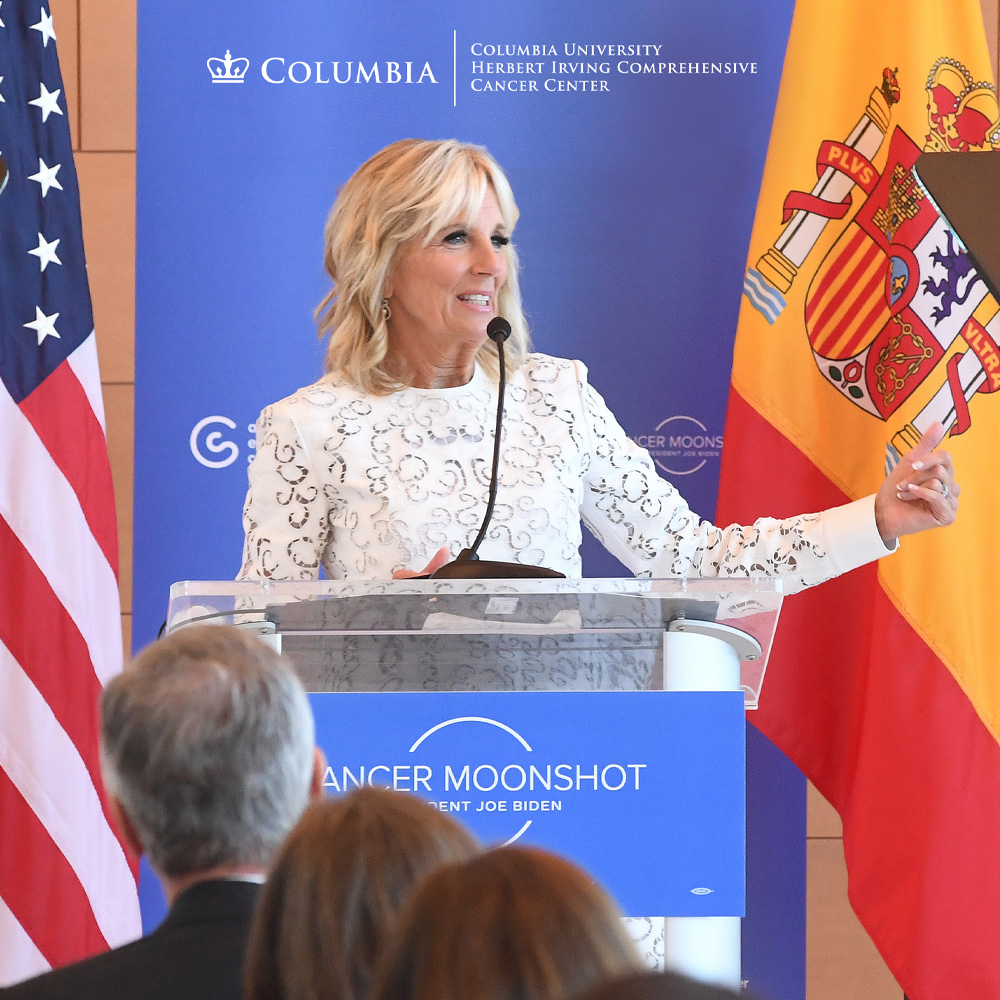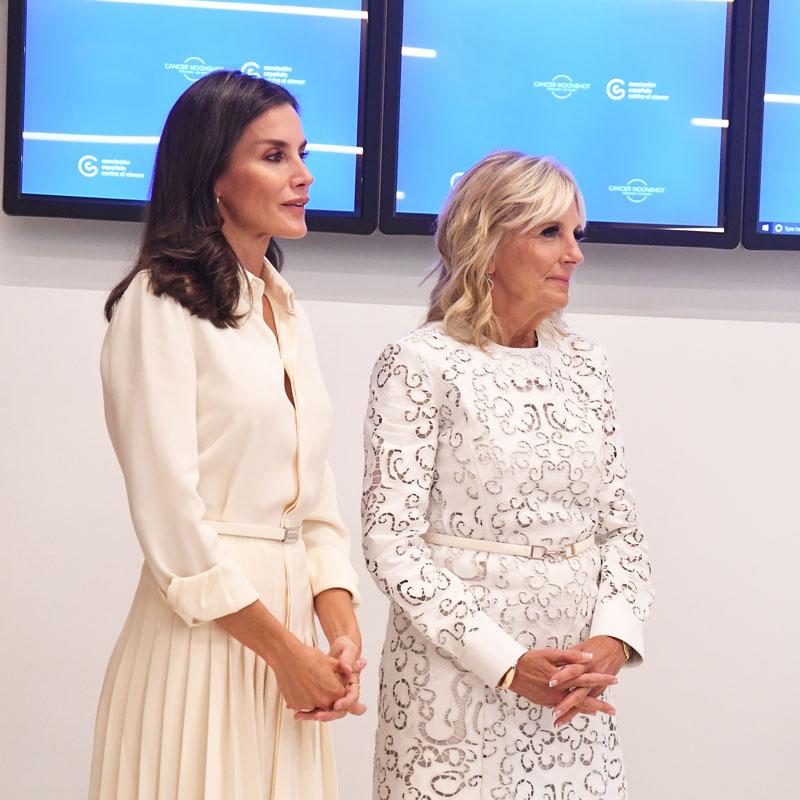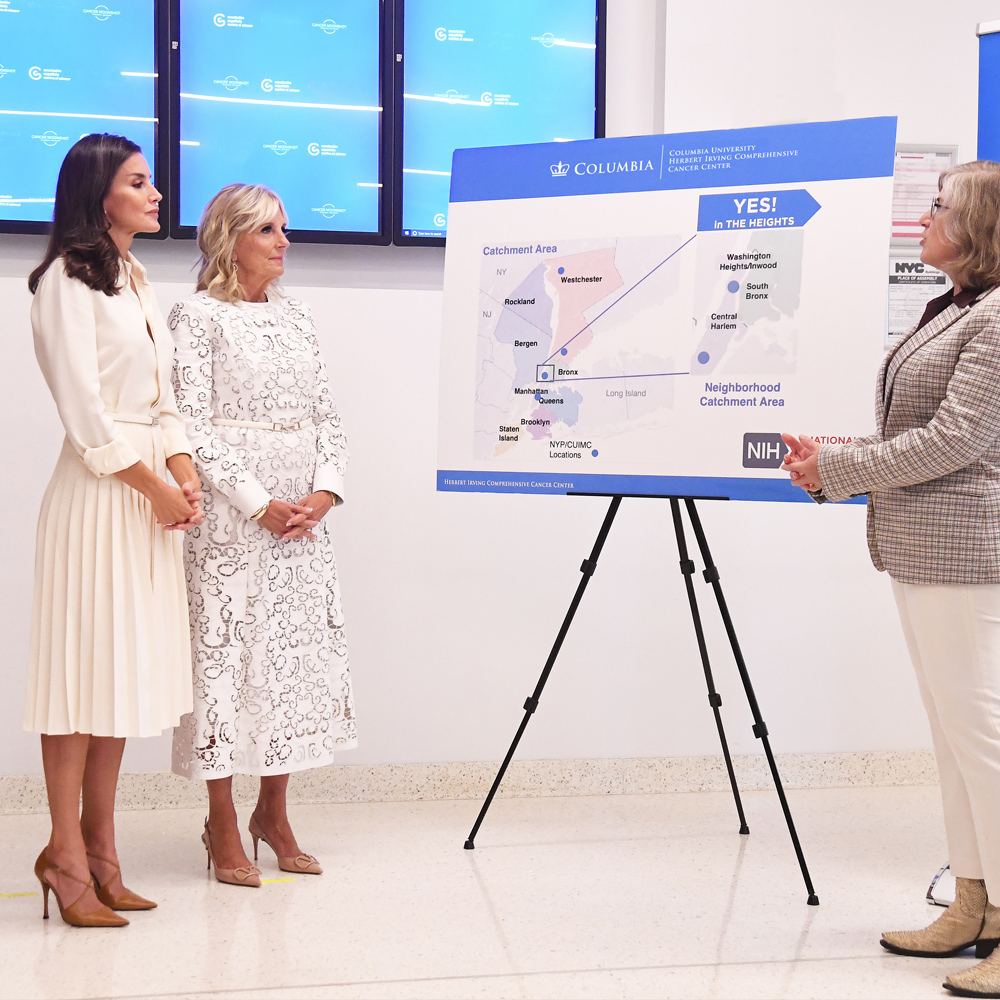Addresses Diversity in Cancer Clinical Trials and Health Inequities
First Lady Jill Biden, joined by Queen Letizia of Spain, stopped at Columbia University Irving Medical Center Sept. 21 to learn about cutting-edge research at the Herbert Irving Comprehensive Cancer Center (HICCC) and the center’s collaborations to transform care, improve diversity and access in clinical trials, and promote diversity and inclusion in science and medicine. The meetings were held at Columbia’s School of Nursing.
Dr. Biden highlighted the cancer center’s ongoing work in addressing health inequities and breaking down barriers to state-of-the-art care, including access to cancer clinical trials. She shared the story of Mario Sambula, a patient enrolled in a clinical trial at the HICCC, and how his care team and nurse navigator, Brianne Bodin, BSN, RN, has helped guide him each step of the way.
“It's stories like [Mario’s], about putting patients in the center of their care, that make the Columbia cancer center so special,” she said. “This cancer center is addressing the deep disparities in care that we've seen just far too often. When it comes to clinical trials, too many people get left behind but this cancer center is changing that.”
Sambula, 85, from Bronx, NY, shared his experience with the First Lady and the Queen as part of the visit at Columbia. Sambula, who came to the U.S. from Honduras when he was 25, was diagnosed with prostate cancer shortly after his retirement in 2002 as a fabric cutter in New York City's garment district. After his cancer diagnosis, he completed treatment and felt well, but a few years later, the cancer returned and had spread. Faced with few options for treatment, Sambula enrolled in a cancer clinical trial at Columbia, which stabilized his disease, now four years and counting.
Mario Sambula (left) with a member of his cancer care team, Brianne Bodin, a clinical trials nurse navigator at the Herbert Irving Comprehensive Cancer Center
“This cancer center is addressing the deep disparities in care that we've seen just far too often. When it comes to clinical trials, too many people get left behind but this cancer center is changing that.”
—First Lady Jill Biden
First Lady Jill Biden (right) with Queen Letizia of Spain at the Sept. 21 Columbia visit
Spotlighting Global Collaborations, Diversity in Clinical Trials, and Community Engagement
The Columbia visit included meetings with researchers co-leading global collaborations, with partnerships in Spain and the Dominican Republic.
Raúl Rabadán, PhD, professor of systems biology and of biomedical informatics at Columbia’s Vagelos College of Physicians and Surgeons (VP&S), discussed his collaboration with the Spanish National Cancer Research Centre, to apply computational approaches to identify high-risk factors for pancreatic cancer. Chin Hur, MD, professor of medicine at VP&S, who specializes in screening and prevention for gastrointestinal cancers, shared details about the HICCC’s partnership with hospitals in the Dominican Republic to address the increasing rates of cancer deaths in that country.
The First Lady and the Queen also met with Mary Beth Terry, PhD, professor of epidemiology at Columbia’s Mailman School of Public Health, who directs the Community Outreach and Engagement office at the HICCC. Dr. Terry showcased the cancer center’s National Cancer Institute-funded YES! in THE HEIGHTS Program, a summer internship for high school and undergraduate students, co-directed by Jasmine McDonald, PhD, that aims to increase the pool of underrepresented and under-resourced youth entering STEM fields.
The problem of underrepresentation and lack of diversity in clinical trials was another topic of discussion for Dr. Biden and Queen Letizia on their Columbia tour. Speaking to Andrew Lassman, MD, associate dean of clinical trials at Columbia and chief of neuro-oncology, they learned about the HICCC’s efforts to increase the participation of underrepresented groups in clinical trials and among clinical researchers. They discussed the importance of diversity among clinical trial participants as a critical step toward reducing racial and ethnic health disparities.
The visit echoed President Joe Biden’s expansion of Cancer Moonshot, with new goals set to reduce the death rate from cancer by at least 50 percent over the next 25 years, and improve the experience of people and their families living with and surviving cancer.
Recognizing this as an ambitious goal, Dr. Biden said, “None of us can beat cancer alone. It takes all of us, sharing our best ideas and practices, working together to ease the burden on patients and their families, and creating the kind of care that saves lives...Together, we can give our people the future they deserve, no matter where they call home.”
“Our commitment to our patients, families, caregivers and the communities in which they reside is of paramount importance and is our north star.”
—Anil K. Rustgi, MD
Director of the Herbert Irving Comprehensive Cancer Center
"This cancer center is addressing the deep disparities in care that we've seen just far too often. When it comes to clinical trials, too many people get left behind but this cancer center is changing that.”
—First Lady Jill Biden
First Lady Jill Biden (right), with Queen Letizia of Spain at the Sept. 21 Columbia visit
Spotlighting Global Collaborations, Diversity in Clinical Trials, and Community Engagement
“Our commitment to our patients, families, caregivers and the communities in which they reside is of paramount importance and is our north star.”
—Anil K. Rustgi, MD
Director of the Herbert Irving Comprehensive Cancer Center
The Columbia visit included meetings with researchers co-leading global collaborations, with partnerships in Spain and the Dominican Republic.
Raúl Rabadán, PhD, professor of systems biology and of biomedical informatics at Columbia’s Vagelos College of Physicians and Surgeons (VP&S), discussed his collaboration with the Spanish National Cancer Research Centre, to apply computational approaches to identify high-risk factors for pancreatic cancer. Chin Hur, MD, professor of medicine at VP&S, who specializes in screening and prevention for gastrointestinal cancers, shared details about the HICCC’s partnership with hospitals in the Dominican Republic to address the increasing rates of cancer deaths in that country.
The First Lady and the Queen also met with Mary Beth Terry, PhD, professor of epidemiology at Columbia’s Mailman School of Public Health, who directs the Community Outreach and Engagement office at the HICCC. Dr. Terry showcased the cancer center’s National Cancer Institute-funded YES! in THE HEIGHTS Program, a summer internship for high school and undergraduate students, co-directed by Jasmine McDonald, PhD, that aims to increase the pool of underrepresented and under-resourced youth entering STEM fields.
The problem of underrepresentation and lack of diversity in clinical trials was another topic of discussion for Dr. Biden and Queen Letizia on their Columbia tour. Speaking to Andrew Lassman, MD, associate dean of clinical trials at Columbia and chief of neuro-oncology, they learned about the HICCC’s efforts to increase the participation of underrepresented groups in clinical trials and among clinical researchers. They discussed the importance of diversity among clinical trial participants as a critical step toward reducing racial and ethnic health disparities.
The visit echoed President Joe Biden’s expansion of Cancer Moonshot, with new goals set to reduce the death rate from cancer by at least 50 percent over the next 25 years, and improve the experience of people and their families living with and surviving cancer.
Recognizing this as an ambitious goal, Dr. Biden said, “None of us can beat cancer alone. It takes all of us, sharing our best ideas and practices, working together to ease the burden on patients and their families, and creating the kind of care that saves lives...Together, we can give our people the future they deserve, no matter where they call home.”





